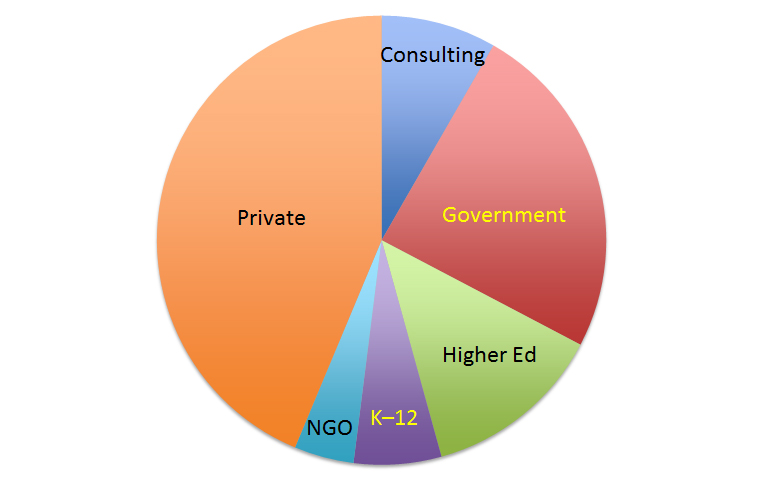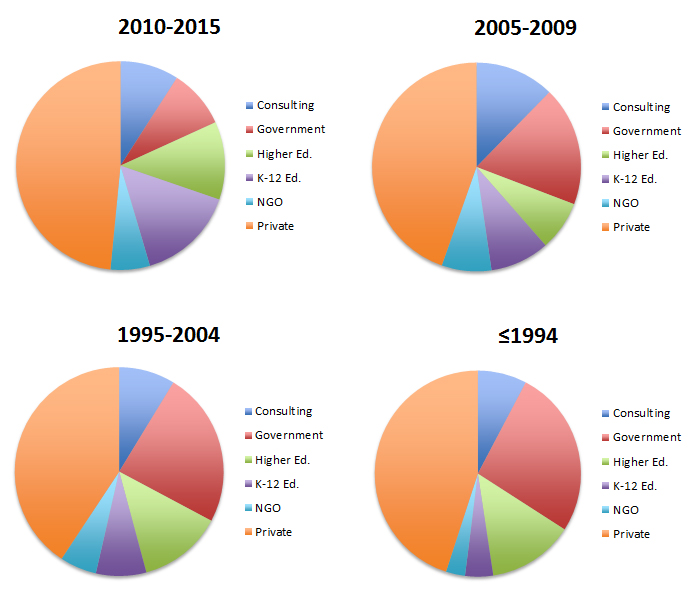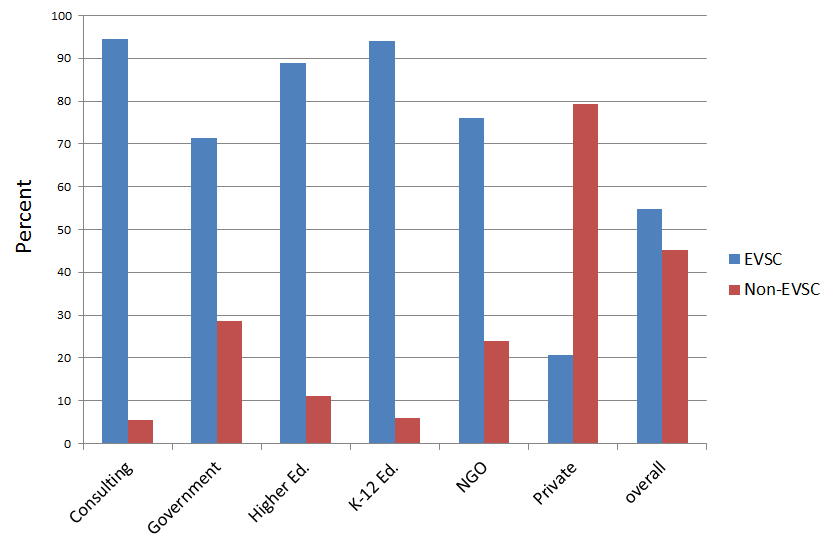Most Environmental Sciences majors concentrate their program in one or two disciplines with future study in professional or graduate programs in mind. Others use the breadth and interdisciplinary nature of the curriculum to prepare for careers in science writing and methods, in teaching, or in environmental management and other similar careers. The flexibilty and diversity of our offerings thus provide a wide array of strategies while simultaneously completing the requirements for the major.
Some examples of Environmental Sciences-related careers of past majors include:
Atmospheric Sciences: Weather and climate forecasting, air quality modelling and management, bioclimatology and agricultural management, research consulting in meteorology and climatology.
Geosciences: Coastal processes consulting, engineering geology, land use planning and management, groundwater pollution research and consulting, sedimentary process modeling.
Ecology: Aquatic ecology and fisheries consulting, forestry and agricultural management, park and recreation planning and management, resource conservation, toxic soil and water pollution research.
Hydrology: Groundwater management, flood and surface water management and consulting, water pollution research and regulation, water project economics, hydraulic modeling and analysis.
Career Tracks
Atmospheric Sciences
Atmospheric researcher: Atmospheric researchers conduct field experiments and examine weather, climate, and atmospheric composition data to gain new insight into atmospheric processes and to improve weather and climate prediction models.
Suggested courses: EVSC 3300 (Atmosphere and Weather), EVSC 3301 (Atmosphere and Weather Lab), EVSC 4320 (Mountain Meteorology), EVSC 4350 (Synoptic Climatology), EVSC 4370 (Microclimatology), EVSC 4452 (Global Climate Variability Seminar), EVSC 4470 (Introduction to Climatological Analysis), EVSC 4490 (Air Pollution), EVSC 4630 (Land-Atmosphere Interaction), EVAT 5300 (Introduction to Climatology), EVAT 5400 (Boundary Layer Meteorology), EVAT 5410 (Atmospheric Dynamics)
Weather forecaster: Government and television weather forecasters provide forecasts to the general public and communicate warnings during severe weather events. Private-sector weather forecasters provide targeted weather information to commercial clients, such as the utilities, insurance, agriculture sectors, and for sporting events.
Suggested courses: EVSC 3300 (Atmosphere and Weather), EVSC 3301 (Atmosphere and Weather Lab), EVSC 4320 (Mountain Meteorology), EVSC 4360 (Weather Forecasting), EVSC 4452 (Global Climate Variability Seminar), EVAT 5410 (Atmospheric Dynamics), EVSC 4559 (Applied Meteorology)
Forensic meteorologist: Forensic meteorologists use historical weather data to reconstruct the weather events that occurred during traffic accidents, house fires, and crimes. They may provide information to insurance companies and/or testify in court cases.
Suggested courses: EVSC 3300 (Atmosphere and Weather), EVSC 3301 (Atmosphere and Weather Lab), EVSC 4340 (Human Biometeorology), EVSC 4320 (Mountain Meteorology), EVSC 4360 (Weather Forecasting), EVSC 4470 (Introduction to Climatological Analysis), EVSC 4559 (Applied Meteorology)
Air quality monitor: Air quality monitors collect and analyze air samples to determine the levels and types of pollutants in the atmosphere.
Suggested courses: EVSC 3300 (Atmosphere and Weather), EVSC 3301 (Atmosphere and Weather Lab), EVSC 4370 (Microclimatology), EVSC 4490 (Air Pollution), EVSC 4630 (Land-Atmosphere Interaction), EVAT 5400 (Boundary Layer Meteorology)
Geosciences and Hydrology
Analytical Laboratory Technician: Manage laboratory equipment and analyze geological, biological, and water samples for a variety of purposes.
Suggested courses: EVSC 4080 (Quantitative Methods in Environmental Sciences), EVSC 3860 (Introduction to Geochemistry), EVSC 4090 (Analytical Chemistry), EVSC 4710 (Environmental Geochemistry), EVSC 4810 (Petrology), EVSC 4870 (Global biogeochemical cycles), EVGE 5840 (Sediment Processes and Environments), EVSC 2050 (Introduction to Oceanography), EVGE 5860 (Isotope Geochemistry), EVGE 5870 (Aqueous Geochemistry), EVSC 4210 (Methods in Aquatic Ecology)
Project Manager at State Environmental Regulatory Agency: Direct state funded soil and groundwater remediation and review reports for compliance determination.
Suggested courses: EVSC 4080 (Quantitative Methods in Environmental Sciences), EVSC 4270 (Soil Science), EVSC 4710 (Environmental Geochemistry), EVSC 2801 (Fundamentals of Geology), EVGE 5870 (Aqueous Geochemistry), EVSC 4660 (Hydrological Field Methods and Data Analysis), EVSC 4880 (Groundwater Geology), EVSC 3020 (GIS Methods), EVSC 4070 (Advanced GIS), EVSC 5030 Applied Statistics for Environmental Scientists
Materials Analyst: Identify types of aggregates used in concrete from quarries, petrographic analysis of concrete cores, measure geotechnical properties of rocks and soils, determine fair market value for commodities materials
Suggested courses: EVSC 2010 (Materials that Shape Civilizations), EVSC 4810 (Petrology), EVSC 4832 (Water-Rock Interactions), EVSC 4820 (Geology and Ecology of US Ore Deposits), EVSC 4840 (Engineering Geology), EVHY 5670 (Environmental Fluid Mechanics), CE 3712 (Introduction to Geotechnical Engineering), EVSC 4270 (Soil Science)
County Hydrologist: Characterize stream drainage and identify water properties and contaminants
Suggested courses: EVSC 4710 (Environmental Geochemistry), EVSC 4080 (Quantitative Methods in Environmental Sciences), EVSC 2800 (Fundamentals of Geology), EVSC 2810 (Fundamentals of Geology Lab), EVSC 3880 (Watershed of Lewis and Clark), EVSC 4660 (Hydrological Field Methods and Data Analysis), EVSC 4880 (Groundwater Geology), EVGE 5870 (Aqueous Geochemistry),
Marine Technician: Conduct ship-based geophysical, biological, and geological surveys
Suggested courses: EVSC 2050 (Introduction to Oceanography), EBSV 3020 (GIS Methods), EVSC 3860 (Introduction to Geochemistry), EVSC 4050 (Topics in Oceanography), EVSC 4870 (Global Biogeochemical Cycles), EVSC 4559 (Marine Biogeochemistry), EVSC 4210 (Methods in Aquatic Ecology), EVSC 4230 (Marine Environments and Organisms), EVSC 4559 (Coastal and Marine Geology), EVSC 5050 (Advanced Oceanography)
Natural Science Museum Outreach Coordinator: Organize and execute outreach and educational efforts
Suggested courses: EVSC 2010 (Materials That Shape Civilizations), EVSC 2800 (Fundamentals of Geology), EVSC 2900 (Beaches, Coasts, and Rivers) EVSC 3810 (Earth Processes as Natural Hazards), EVSC 3840 (Earth Surface Processes and Landforms), EVSC 4810 (Petrology)
Non-discipline-based Career Tracks
Environmental Consultant: Site assessment and characterization, soil and groundwater remediation, emergency response, work with state regulators.
Suggested courses: EVSC 2800 (Fundamentals of Geology), EVSC 2900 (Beaches, Coasts and Rivers), EVSC 3020 (GIS Methods), EVSC 4010 (Remote Sensing), EVSC 4070 (Advanced GIS), EVSC 4080 (Quantitative Methods in Environmental Sciences), EVSC 4270 (Soil Science), EVSC 4710 (Environmental Geochemistry), EVSC 4660 (Hydrological Field Methods and Data Analysis), EVSC 4832 (Water-Rock Interactions), EVSC 4880 (Groundwater Geology), EVSC 5030 Applied Statistics for Environmental Scientists, EVGE 5870 (Aqueous Geochemistry)
Environmental data analyst: Environmental data analysts examine a variety of environmental data extracted for specific purposes, such as examining impacts of weather or climate variability, water quality trends, or environmental health impacts. These analysts typically employ a variety of statistical data analysis and/or mapping tools.
Suggested courses: EVSC 3020 (GIS Methods), EVSC 4010 (Introduction to Remote Sensing), EVSC 4070 (Advanced GIS), EVSC 4080 (Quantitative Methods in Environmental Sciences), EVSC 4470 (Introduction to Climatologial Analysis), EVSC 5020 (Introduction to GIS), EVSC 5030 (Applied Statistics for Environmental Scientists)
GIS Analyst: Production of maps and digitizing site surveys for environmental consulting projects
Suggested courses: EVSC 2800 (Fundamentals of Geology), EVSC 3020 (GIS Methods), EVSC 4010 (Introduction to Remote Sensing), EVSC 4070 (Advanced GIS), EVSC 4080 (Quantitative Methods in Environmental Sciences), EVSC 4270 (Soil Science), EVSC 4660 (Hydrological Field Methods and Data Analysis), EVSC 5030 (Applied Statistics for Environmental Scientists), EVGE 5840 (Sediment Processes and Environments)
*Please note: the ecology career tracks section and additional hydrology-related careers are expected to be added in the near future.
Environmental Sciences Careers Inventory
In 2015, employment information was examined for all Environmental Sciences graduates from the founding of the Department (the first graduating class was 1974) through 2014. The dataset, kindly provided via the UVa Alumni Association, included data for over 2400 students (mostly undergraduates). The employment data were based upon self-reported information, so the record’s accuracy depends entirely on the accuracy and timeliness of the information provided.
Each person was classified into one of six groups based upon the information provided under “employer” and “job title”:
private (for-profit companies)
government (federal, state, local)
non-governmental organization (not-for-profit, non-governmental firms)
consulting (private, for-profit companies that provide services)
K–12 education
higher education

Most EVSC graduates work for private industry, and about one-quarter of EVSC graduates are employed by the government.

The most obvious trends in changes of EVSC alumni through time are that governmental employment has declined over time and that consulting has grown. The private sector continues to account for almost half of employment of EVSC majors.

With the exception of the “private” category, EVSC graduates are much more likely to work in a field that utilizes their EVSC training than other fields.
